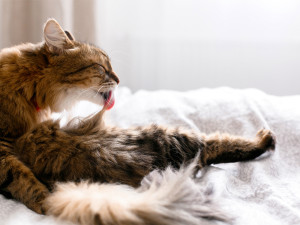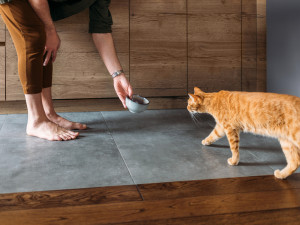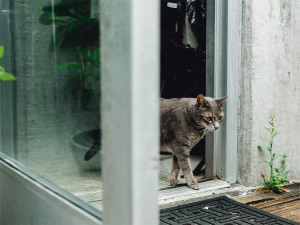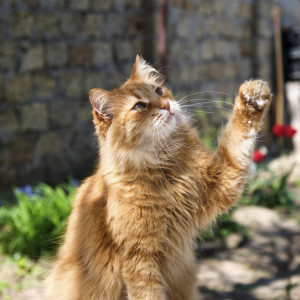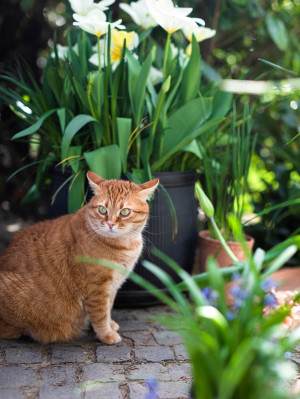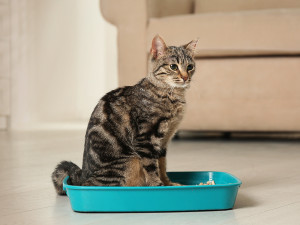Cats Lifespan: How Long Do Cats Live?
They are the absolute light of your life. Here’s how you can help them live as close to forever as possible

Share Article
So, you’ve decided to adopt a kitten. You are scouring the websites of local rescues, and you already have several TV show-inspired names in mind, obviously. Before you decide to adopt a kitten named Shiv Roy, you may wonder how long that commitment will last. Or maybe you already have a cat and worry about how long you have left with them (do yourself a favour and try not to torture yourself like this).
Despite our wishes, the fact remains that cats don’t live as long as humans. This is out of our control. But there are some things that cat parents can do to give their kitties the best chance of living as long as possible.

Get (totally free) deals for food, treats, accessories, tech and way more pet parenting must-haves.
opens in a new tabHow long do cats live?
On average, indoor cats live about 10–16 years. Cats who are allowed to roam outside have a considerably shorter life expectancy than those enjoying a cosy life indoors. Innate factors, such as breed and genetics, can affect life expectancy, but pet parents have an impact as well.
What factors can affect a cat’s lifespan?
Breed
Mixed breed cats tend to live longer than purebred cats. The most common cat breed in the UK, the Domestic Shorthair, is typically considered a mixed breed cat. Mixed genetics are thought to contribute to their longevity. There are some outliers among purebred cats, though: Siamese, Persian, and Burmese cats tend to live longer and commonly reach their late teens. Bengals, Maine Coons and Ragdolls are some breeds that tend to have shorter lifespans.
Health
Chronic disease of any type can have a detrimental impact on life expectancy. Kidney disease is a common chronic ailment of older cats. Cats with diabetes, hyperthyroid disease, or heart disease are likely to have shorter lifespans as well.
Diet
A complete and balanced diet can help a cat live a longer, healthier life. Kittens need proper nutrition from the start. Adult cats fed an appropriate amount of food are less likely to become obese, which can shorten their lifespan.
Exercise
Adequate exercise is key to longevity. Cats who get regular activity are less likely to become obese, making them less likely to develop arthritis or diabetes.
Stress
Persistent stress can shave time off a cat’s life, much like it does in people. Cats can live longer when they feel safe and comfortable instead of stressed.
Environment
Indoor cats live longer than cats who go outdoors. Being outdoors exposes cats to increased risk of injury, cars and the stress of extreme weather. Encounters with wildlife and other animals leave cats at risk for fight wounds and infectious diseases.
Veterinary care
Cats who receive regular veterinary care live longer. Routine veterinary care has two main benefits: disease prevention and early detection.
How can I determine if my cat is ageing or experiencing health problems?
‘Slowing down’ is considered a normal part of ageing, but that doesn’t mean that a cat loses all of their spark once they hit their senior years. There is some overlap in the signs of ageing and the signs that something is wrong, but your cat should be able to do basic, everyday activities with ease. These include eating, drinking, grooming and using the litter box. If you ever have concerns about any changes in your cat’s appearance or behaviour, the best bet is to have them examined by a veterinarian. Signs that your cat is ageing may include:
decreased activity
increased sleep
decreased food intake
weight loss
difficulty grooming
cloudy eyes
dull coat
When you notice subtle signs of ageing, your first step should be to have your cat evaluated and have a discussion with your vet about senior cat care. Your vet may recommend more frequent check-ups or more in-depth diagnostics during wellness visits to screen for underlying issues.
How do I take care of my ageing cat?
Even healthy older cats may need some accommodations. Be sure to limit obstacles your cat may face to get to the things they want and need. This includes providing a low-sided litter box, getting pet stairs, and making sure food and water are easy to access, even in the dark. While not everything is in your control, there are things you can do to help your cat grow old gracefully.
Provide a healthy diet
Unless your vet recommends otherwise, feed your cat a diet that’s high in protein and low in carbohydrates. Reputable commercial diets can ensure that your cat gets all the nutrients they need. Take care to not overfeed and make sure your cat always has easy access to fresh water.
Provide regular exercise
Cats grow out of kittenhood, but they don’t grow out of playtime. Exercise helps keep cats agile and trim. Provide cat-safe toys and safe play spaces like cat trees.
Help with grooming
Your cat may not be able to contort themselves for thorough self-grooming, so brush your cat regularly to help maintain a healthy coat and ward off hairballs.
Reduce stress
Cats thrive when they feel safe and secure, and stress can shorten their lives. Keep your cat’s necessities in areas that are quiet and stress-free. This means providing cosy places to sleep and keeping litter boxes away from loud appliances.
Keep your cat indoors
One of the most significant things you can do to prolong your cat’s life expectancy is to keep them indoors. Indoor cats have less exposure to disease, parasites and trauma.
Take your cat to the vet
As cats age, they need more frequent vet visits to screen for underlying issues or to monitor chronic conditions. Opt for prevention rather than treatment by pursuing vaccination, early spay/neuter surgery, monthly preventatives and routine check-ups. Not every disease can be prevented, but the earlier a problem is caught and treated, the better the outcome tends to be.
Frequently asked questions
What are common health issues that can affect a cat’s lifespan?
Chronic diseases, such as kidney disease, diabetes and hyperthyroidism can shorten a cat’s lifespan.
How long do cats live?
Indoor cats live 10–16 years. Outdoor cats may not live as long.
Do indoor cats live longer than outdoor cats?
Indoor cats typically live longer than outdoor cats.
How can I determine if my cat is ageing or experiencing health problems?
Your cats may be experiencing health problems if they are not able to do normal tasks, such as eating, grooming and using the litter box.
Are there any special considerations for senior cats?
Senior cats need more frequent check-ups and may need accommodations like pet stairs to help with any decreased mobility.

Dr. Alycia Washington, DVM, MS
Alycia Washington, DVM, is a small animal emergency veterinarian based in North Carolina. She works as a relief veterinarianopens in a new tab and provides services to numerous emergency and specialty hospitals. Dr. Washington is also a children’s book author and freelance writer with a focus on veterinary medicine. She has a special fondness for turtles, honey bees, and penguins — none of which she treats. In her free time, Dr. Washington enjoys travel, good food, and good enough coffee.
Related articles
- opens in a new tab
Your Cat Is Limping. Now What?
When it’s no big deal and when you should worry
![Ginger adult cat sits in flowering summer garden on pavement.]() opens in a new tab
opens in a new tabWhat to Do if Your Cat Gets Stung By a Bee
It’s not always as simple as scraping out the stinger. Find out everything you need to know
![Cat sitting in a teal litter box]() opens in a new tab
opens in a new tabMastering the Art of Litter Box Training: How to Train Cats to Use a Litter Box
If you do nothing else, teach your cat to poo in their litter box (and not in your shoe)
![Gray and white cat walking out the door]() opens in a new tab
opens in a new tabPreventing Escape Artists: How to Keep Your Indoor Cat From Running Away
Your kitty’s an explorer. But if you want to keep their expeditions indoors, here‘s how
![Maine coon cat using the litter box.]() opens in a new tab
opens in a new tabUncovered Secrets: Why Cats Don’t Always Cover Their Poo
And how you can encourage them to cover up after doing their business
